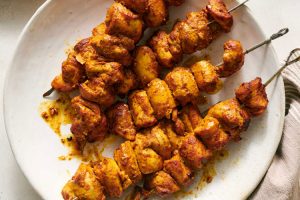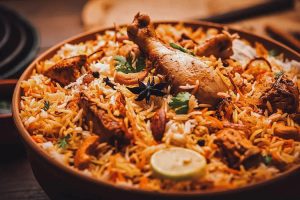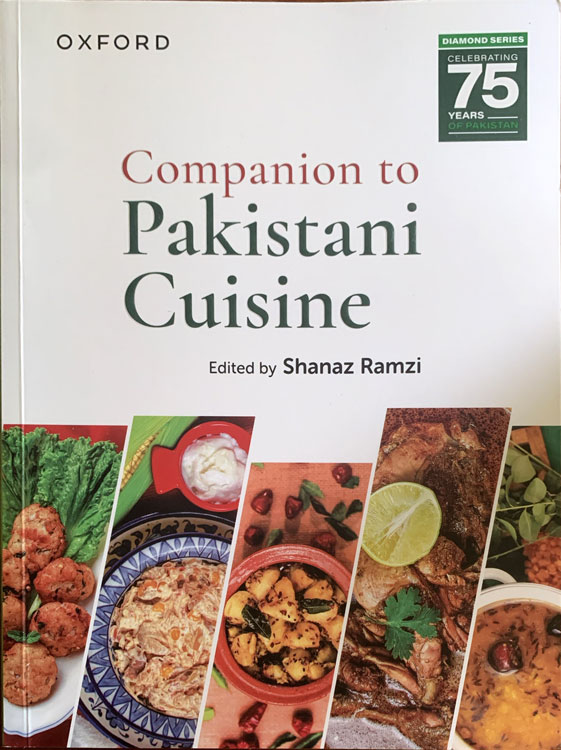Food is something of a national obsession with Pakistanis! The plethora of restaurants and popularity of cooking shows, is only rivaled by the extreme attention given to preparing meals in every household. We have a rich and varied culinary heritage which reflects the diversity of this land and it is something we can truly be proud of.
With the Oxforfd Companion to Pakistani Cuisine, editor Shanaz Ramzi has taken an organized approach to present an excellent reference book as well as a a quick overview of the multi-faceted world of Pakistani cuisine. The book is a useful resource not only for those interested in cooking but for anyone delving into the history, anthropology or culture of this region.
Shanaz, currently the CEO of Star Links PR and Events, has had rich and varied career. As a journalist and writer, she has been writing on food and culture for many years. We caught up with her to speak about her latest contribution.
This is your second book on Pakistani cuisine?
Yes, my first book, also published by Oxford University Press (OUP) was another reference book on Pakistani cuisine, but it took a more geographical approach. It was the first book of its kind, focusing on the geographical and historical factors that have resulted in the development of our varied cuisine.
 Why did you choose an alphabetical format?
Why did you choose an alphabetical format?
This is an in-depth reference book and guide to not only the dishes that are cooked in Pakistan, but the utensils and ingredients used to create them, the communities in which they originated, the anecdotes attached to some of the dishes, and much more. The Companions that OUP gave me as references all had entries in alphabetical order, so I adhered to their format.
I have also deviated slightly from the traditional format of entries by including a few essays on topics I felt deserved to be covered in greater detail.
What was the criteria in choosing what to retain?
My first book Food Prints was a great resource and made it relatively easy for me to decide what aspects should definitely be covered. Since I had already gone to great lengths to do research for that book, I had a good ideas of all the material that needed to be incorporated. Having said that, I must admit that there were a lot of headwords that I had to add in The Companion that were not in my earlier book as this one is a more comprehensive version of the former. Just to give you an example, ‘mango’ may not have been a separate entry in my first book, because it focused mostly on dishes and the communities that made them and not on the crops grown in our country. However, for this book, all the vegetables, fruits and grains grown in Pakistan had to be incorporated. Many headwords had not been in my initial list which I had shared with OUP before embarking on the book, but were entered during the course of my research, when I realized they were too important to be left out.
Do you have a special interest in cuisines or cooking?
I love to cook and I love to experiment. I especially enjoy trying out dishes that I am not familiar with but which may be the hallmark of a community or region. My first book also contains recipes – both regional favourites and my own personal preferences. My second book, Food Tales is a recipe book and contains all the recipes I make with little anecdotes attached to many.
 What was your criteria for selecting contributors for the Companion?
What was your criteria for selecting contributors for the Companion?
Since the scope of the book encompassed not just cuisine but history, archaeology, crop production, communities and much more, I was looking for people from diverse walks of life to contribute to the book. Of course, known names in the culinary world were a must as well.
How was your experience working with so many contributors?
It was a nightmare! Identifying the right people for the task, assigning them headwords to choose from, often going back and forth with the options, and then finally getting them to agree to do research and contribute a certain number of entries was just the initial hurdle. Most did not believe in meeting deadlines and I had a difficult time chasing them to send their contributions.
 Since there were restrictions to the number of entries each contributor could submit, I couldn’t just up and give more entries to those contributors who were prompt in their submissions. Finally, thanks to covid, when I wound up with a lot of time on my hands, I decided I would just tackle all the remaining headwords on my own, and complete the book. And that’s how it finally saw the light of day!
Since there were restrictions to the number of entries each contributor could submit, I couldn’t just up and give more entries to those contributors who were prompt in their submissions. Finally, thanks to covid, when I wound up with a lot of time on my hands, I decided I would just tackle all the remaining headwords on my own, and complete the book. And that’s how it finally saw the light of day!
Companion to Pakistani Cuisine
Edited by Shanaz Ramzi
Published by Oxford University Press




















